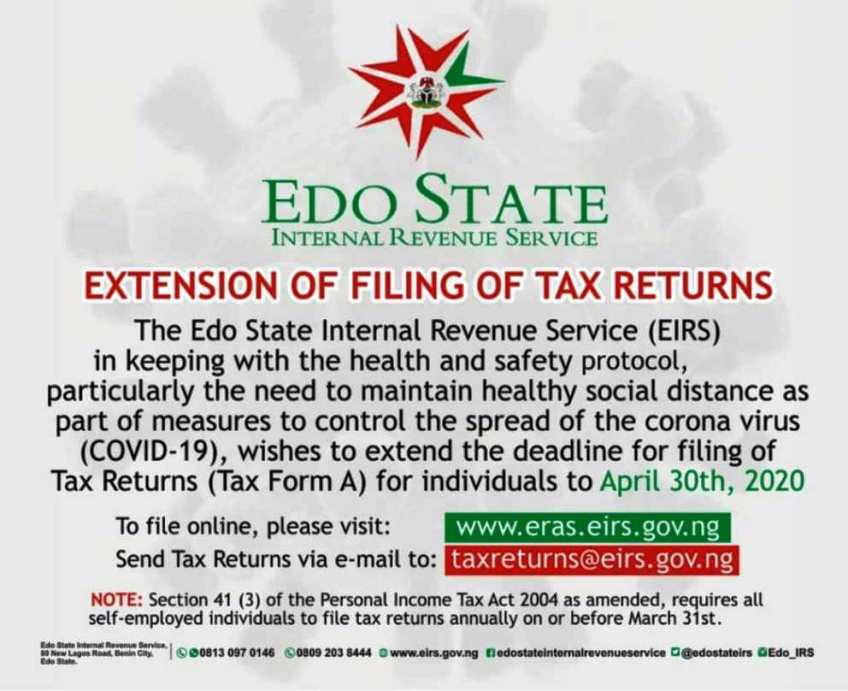TAX LAW
Please download the full Tax Laws here
The Revenue Administration Law gives the Board of Internal Revenue the powers to perform the following functions:
- Providing general policy guidelines regarding the functions of the Internal Revenue Service and supervising the implementation of such policies;
- Ensuring the effective and optimum collection of all revenue, including levies and penalties due to the State Government under the relevant Federal and State Laws;
- Doing all such things that may be deemed necessary and expedient for the assessment and collection of revenue;
- Accounting for all amounts so collected in a manner to be prescribed by the Governor;
- Making recommendations, where appropriate, to the Joint Tax Board on tax policy, tax reform, tax registration, tax treaties and exemptions as may be required from time to time;
- Such other things as are in the opinion of the Board necessary to ensure the efficient performance of the functions of the Internal Revenue Service under the Law establishing it.
Furthermore, the Board of Internal Revenue is charged with the responsibility of:
- Appointing, promoting, transferring and imposing discipline on employees of the Internal Revenue Service;
- Making recommendations to the Governor regarding the terms and conditions of employment and the remuneration of staff of the Internal Revenue Service;
- Controlling the management of the Internal Revenue Service on matter of policy, subject to the provisions of any regulations setting up the Internal Revenue Service.
On the other hand, the Internal Revenue Service, which is the operational arm of the Board, has the powers to perform the following functions:
- Assess all persons chargeable with tax in Edo State;
- Collect, recover and pay to the designated account any tax or levy due to the State Government under this or any other enactment;
- Enforce payment of due taxes;
- In collaboration with the relevant ministries and agencies, review the tax regime and promote the application of tax revenue to stimulate economic activities and development;
- In collaboration with the relevant law enforcement agencies, carry out the examination and investigation of all cases of tax fraud or evasion with a view to determining compliance with the provisions of this or any other relevant enactment;
- Make, from time to time, a determination of the extent of financial loss and such other losses by government arising from tax fraud or evasion and such other losses (or revenue foregone) arising from tax waivers and other related matters;
- Adopt measures to indentify, trace, freeze, confiscate or seize the proceeds of tax fraud or evasion;
- Adopt measures which include compliance, enforcement and regulatory actions as well as introduction and maintenance of investigation and control techniques for the detection and prevention of non-compliance;
- Collaborate and facilitate rapid exchange of scientific and technical information with relevant national or international agencies or bodies on tax matters;
- Undertake exchange of personnel or other experts with complementary agencies for purposes of comparative experience and capacity building;
- Establish and maintain a system for monitoring international dynamics of taxation in order to identify suspicious transactions and the persons involved;
- Provide, access and maintain an up-to-date adequate data and information on all taxable persons, individuals or corporations, for the purpose of efficient, effective and correct tax administration to prevent tax evasion or fraud;
- Maintain database, statistics, records and reports on persons, organizations, proceeds, properties, documents or other items of assets relating to tax waivers, fraud or evasion;
- Collate and keep under review all policies of the State Government relating to taxation and revenue generation and undertake a systematic and progressive implementation of such policies;
- Maintain a liaison with the Office of the Attorney- General of the State, all government, security and law enforcement agencies and such other financial supervisory institutions in the enforcement and eradication of tax related offence;
- Issue taxpayer identification number to every person taxable in Edo State;
- From time to time specify the form of return, claim, statement and notices necessary for the due administration of the powers conferred on it by this Law or any other enactment;
- Carry out and sustain public awareness and enlightenment campaigns on the benefits of tax compliance within the State; and
- Carry out such other activities as are necessary/ expedient for the full discharge of all or any of the functions prescribed under this law.
Please download the full Tax Laws here

